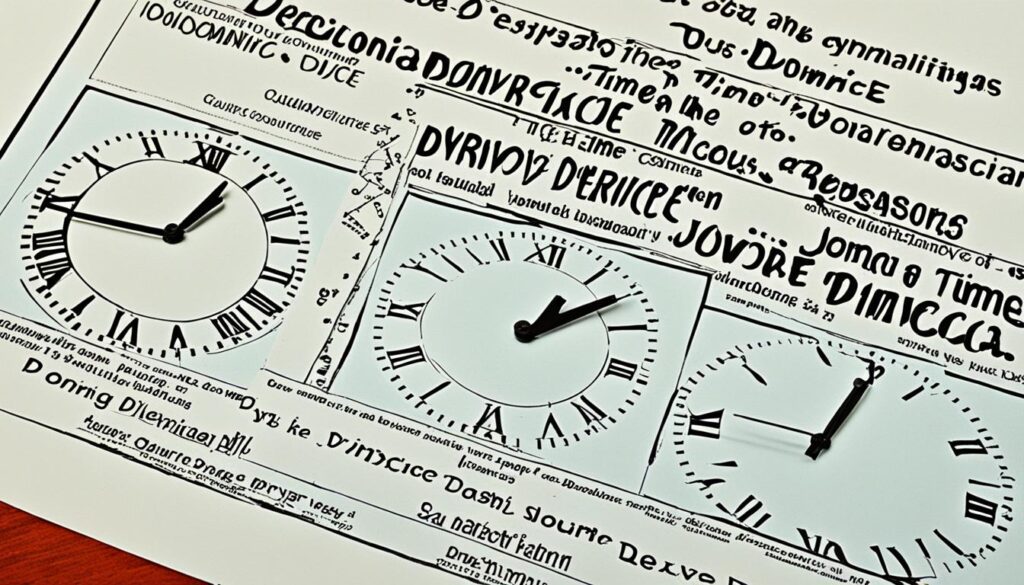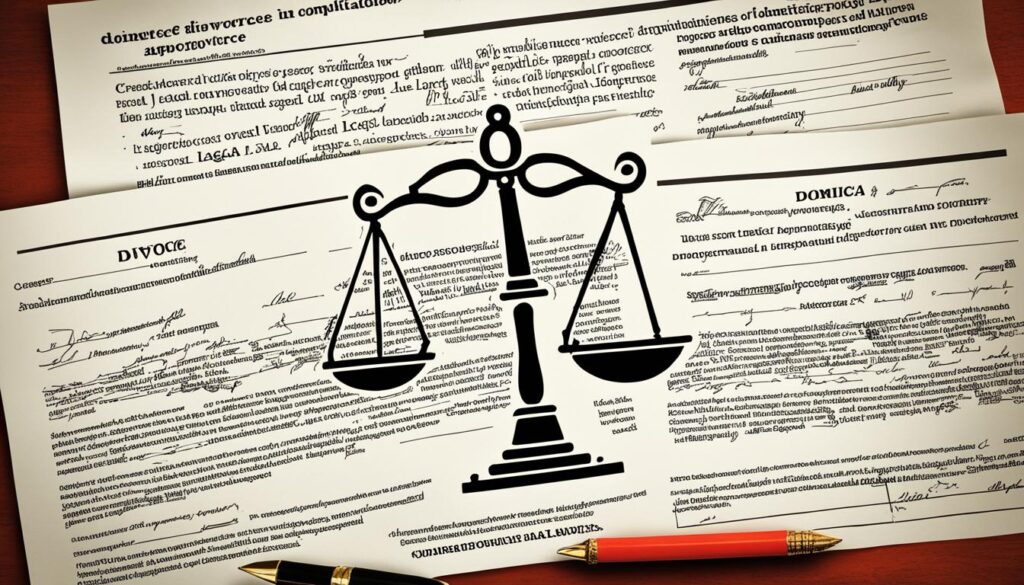Divorcing in Dominica as a U.S. citizen may present some challenges, however, with the proper assistance, it is feasible to understand the legal procedures and reach a positive resolution.
When considering a divorce in Dominica, it is recommended to consult with a local attorney who specializes in family law. They can provide valuable insights, guide you through the process, and ensure that your rights are protected.
It’s important to be aware of the legal limitations and requirements when getting divorced in Dominica, as well as the recognition of a Dominican divorce in the U.S. Each state may have different rules regarding the recognition of foreign divorces, so it’s advisable to consult with an attorney in your state to determine the validity of a Dominican divorce.
In this comprehensive guide, we will explore the types of divorces available in Dominica, the grounds for divorce, the divorce process, child custody and support arrangements, division of assets and liabilities, legal representation, timeframe for divorce, and options for appeals and modifications.
Key Takeaways:
- Consult with a local attorney in Dominica who specializes in family law when getting divorced in Dominica as a U.S. resident.
- Be aware of the legal limitations and requirements, as well as the recognition of a Dominican divorce in the U.S.
- Types of divorces in Dominica include divorce by mutual consent and divorce for cause.
- Grounds for divorce in Dominica include adultery, cruelty, desertion, and long separation.
- The divorce process in Dominica involves filing a petition, providing evidence, and attending court hearings.
Types of Divorce in Dominica
When it comes to getting divorced in Dominica, there are two main types of divorces available to foreigners: divorce by mutual consent and divorce for cause. Let’s explore each type:
1. Divorce by Mutual Consent:
In a divorce by mutual consent, both parties agree to end the marriage without the need to provide a specific cause. This type of divorce is the most common for foreigners seeking a divorce in Dominica. It allows couples to part ways amicably and without the need for lengthy legal battles.
2. Divorce for Cause:
If one spouse does not agree to the divorce, the other party can seek a divorce for cause. This type of divorce requires proving one of the listed causes for divorce under Dominican law. Some common causes for divorce in Dominica include:
- Adultery
- Cruelty
- Desertion
- Long separation
By providing evidence of one of these causes, the party seeking the divorce can proceed with the legal process.
Now that we have explored the types of divorces available in Dominica, let’s move on to understanding the grounds for divorce in the next section.
| Types of Divorce | Description |
|---|---|
| Divorce by Mutual Consent | Both parties agree to end the marriage without providing a specific cause. |
| Divorce for Cause | One party seeks a divorce by proving one of the listed causes under Dominican law, such as adultery, cruelty, desertion, or long separation. |
Grounds for Divorce in Dominica
When considering a divorce in Dominica, it is essential to understand the grounds on which such a legal action can be pursued. These grounds serve as the legal basis for seeking a divorce and must be proven in court. By consulting with an attorney familiar with Dominican divorce laws, individuals can determine the most appropriate grounds for their specific situation.
Adultery is one of the grounds for divorce in Dominica. If a spouse can provide evidence of their partner engaging in an extramarital affair, it can be used as a basis for ending the marriage. However, it is crucial to consult with legal professionals to understand the evidentiary requirements and the court’s expectations.
Another ground for divorce is cruelty. If a spouse has been subjected to physical or emotional abuse, they may seek a divorce on the grounds of cruelty. It is necessary to gather supporting evidence and work closely with legal counsel to present a compelling case.
Desertion is also recognized as a valid ground for divorce in Dominica. If one spouse has abandoned the other for a significant period without any intention of returning, the deserted party may seek a divorce based on this ground. Legal guidance is crucial to navigate the complexities associated with proving desertion.
Additionally, long separation can be a ground for divorce. In Dominica, if a couple has been living apart for an extended period, typically at least two years, they may seek a divorce based on this ground. It is important to consult with an attorney to understand the specific requirements and documentation needed for a long separation divorce.
“Understanding the grounds for divorce is fundamental to initiating the legal process in Dominica. By working with knowledgeable attorneys, individuals can gather the necessary evidence and build a strong case based on the specific grounds applicable to their situation.”
It is vital to emphasize that divorce laws can be complex, and legal advice is essential when determining the grounds for divorce in Dominica. By consulting with experienced attorneys, individuals can navigate the intricacies of the legal system, gather the necessary evidence, and present a compelling case to seek a divorce.
Divorce Process in Dominica
The divorce process in Dominica can be a complex and challenging journey. Understanding the steps involved and the importance of legal representation is crucial for achieving a successful outcome. In this section, we will provide a comprehensive overview of the divorce process in Dominica, highlighting key considerations and recommendations.
Filing a Petition with the Family Court
To initiate the divorce process in Dominica, the first step is to file a petition with the Family Court. The petition outlines the grounds for divorce and provides necessary information about the marriage, such as the date of marriage, names of the spouses, and any relevant details regarding children or marital assets.
“Filing the petition is a critical step in the divorce process in Dominica. It marks the official beginning of the legal proceedings and sets the stage for the subsequent steps.”
Providing Evidence to Support Grounds for Divorce
Once the petition is filed, it is important to gather and present evidence to support the grounds for divorce. The grounds for divorce in Dominica include adultery, cruelty, desertion, and long separation, among others. Evidence, such as photographs, witness statements, or communication records, can help substantiate the claims made in the petition.
Attending Court Hearings
After filing the petition and providing the necessary evidence, both parties will be required to attend court hearings. These hearings serve as opportunities to present arguments, respond to the opposing party’s claims, and address any issues related to child custody, support, or the division of assets and liabilities.
Hiring an Experienced Divorce Attorney
The divorce process in Dominica can be complex, especially if one party contests the divorce. To navigate the process effectively, it is highly recommended to hire an experienced divorce attorney who is familiar with Dominican divorce laws and can provide expert guidance and representation. An attorney can help protect your rights, handle legal complexities, and advocate for your best interests.
Protecting Your Rights and Achieving a Fair Resolution
Divorce proceedings can be emotionally challenging, but it is essential to prioritize protecting your rights and achieving a fair resolution. With the support of a knowledgeable attorney, you can navigate the divorce process in Dominica with confidence, ensuring that your interests are represented and that any child custody or asset division issues are addressed equitably.
| Advantages of Hiring a Divorce Attorney in Dominica | Benefits |
|---|---|
| Expert Guidance | An experienced attorney can provide valuable guidance throughout the divorce process, ensuring that you understand your rights and obligations. |
| Legal Representation | An attorney will represent your interests in court, handle negotiations, and communicate with the opposing party or their legal counsel. |
| Paperwork Preparation | An attorney will assist in preparing the necessary paperwork accurately, ensuring compliance with legal requirements. |
| Strategy and Advocacy | An attorney will develop a legal strategy tailored to your unique circumstances and advocate for your best interests throughout the divorce proceedings. |
In conclusion, the divorce process in Dominica requires careful navigation and professional guidance. By understanding the steps involved, gathering evidence, and hiring an experienced divorce attorney, individuals can protect their rights and work towards a fair resolution. Remember that each case is unique, and it is important to consult with an attorney to receive personalized advice based on your specific situation.

Child Custody and Support in Dominica
In divorce cases involving children, the court plays a crucial role in determining child custody and support arrangements in Dominica. The primary focus of the court is to make decisions that are in the best interests of the child. Various factors are considered in this determination, including parental fitness, the child’s relationship with each parent, and the child’s overall well-being.
To ensure that your rights as a parent and the best interests of the child are protected during the divorce process, it is vital to work with an experienced attorney who specializes in family law. They will guide you through the legal proceedings and provide valuable advice on matters related to child custody and support.
When it comes to child custody, the court aims to create a custody arrangement that promotes the child’s stability and welfare. This usually involves deciding on legal custody, which determines who makes important decisions about the child’s upbringing, and physical custody, which determines where the child will primarily reside.
Child support is another critical aspect of divorce cases that involve children. It is the financial obligation of the non-custodial parent to contribute to the child’s expenses, including education, healthcare, and basic needs. The court will assess the financial situations of both parents and establish an appropriate child support amount based on the child’s requirements and the income of each parent.
Working with a knowledgeable attorney will ensure that you have a clear understanding of your rights and responsibilities as a parent regarding child custody and support. They will advocate for your interests in court and help you navigate complex legal procedures to achieve a fair and favorable outcome.
Key Points:
- The court determines child custody and support arrangements in Dominica based on the best interests of the child.
- Factors such as parental fitness, the child’s relationship with each parent, and the child’s well-being are considered.
- Consulting with an experienced attorney specializing in family law is crucial to protect your rights.
- Custody arrangements focus on legal and physical custody to ensure the child’s stability and welfare.
- Child support is the financial obligation of the non-custodial parent to contribute to the child’s expenses.
| Child Custody | Child Support |
|---|---|
| Determined by the court based on the child’s best interests, parental fitness, and relationship with each parent. | Calculated by assessing the financial situations of both parents and establishing an appropriate amount based on the child’s needs and parental income. |
| Involves decisions on legal and physical custody, determining decision-making authority and the child’s primary residence. | Includes financial contributions from the non-custodial parent to cover the child’s education, healthcare, and basic needs. |
| Working with an experienced attorney is essential to protect your rights and navigate the legal process. | An attorney specializing in family law will advocate for your interests and ensure a fair outcome. |

Division of Assets and Liabilities in Dominica
In the process of divorce in Dominica, the division of assets and liabilities is governed by the principle of equitable distribution. The court aims to divide marital property and debts fairly between the spouses, taking into account various factors.
Factors such as the length of the marriage, each party’s contributions, and the financial needs of each party are considered in determining the division. The goal is to ensure that both spouses receive a fair share of the assets and assume an equitable portion of the debts.
During the divorce proceedings, it is crucial to provide evidence of the assets and liabilities held by both parties. This can include financial statements, property documentation, and other relevant documents that demonstrate the value and ownership of the assets and debts.
To ensure a fair distribution, it is highly recommended to work with an experienced divorce attorney in Dominica. An attorney can guide you through the process, protect your rights, and advocate for a division that aligns with your best interests.
Here is an example of how the division of assets and liabilities could be represented in a table:
| Assets | Liabilities |
|---|---|
| Family Home | Mortgage |
| Investment Portfolio | Credit Card Debt |
| Vehicle | Personal Loans |
Remember, each divorce case is unique, and the division of assets and liabilities will depend on the specific circumstances of the marriage and the financial situation of the parties involved. Working with a qualified attorney is essential to ensure that your rights are protected and that the division is fair and equitable.

Stay tuned for the next section, where we will explore the importance of legal representation in divorce cases in Dominica.
Legal Representation in Divorce Cases in Dominica
When going through a divorce in Dominica, it is crucial to have proper legal representation to navigate the complexities of the legal process and protect your interests. Hiring a divorce attorney in Dominica can be instrumental in ensuring that you make informed decisions and receive fair treatment throughout the divorce proceedings.
With their expertise in family law and divorce cases, a skilled attorney can provide valuable advice tailored to your specific situation. They will guide you through each step of the process, from filing the necessary documents to representing you in court hearings. Their in-depth knowledge of Dominican divorce laws and procedures allows them to effectively advocate for your rights and interests.
An experienced divorce attorney can also assist in negotiating with your spouse or their attorney to reach a favorable settlement agreement. They will work tirelessly to secure the best possible outcome for you, whether it’s concerning child custody, alimony, or the division of assets and liabilities.
Additionally, a divorce attorney can ensure that all the legal requirements are met throughout the process. From gathering evidence to establishing proper grounds for divorce, they will handle the intricate paperwork and ensure that everything is in compliance with the law.
Having legal representation in your divorce case in Dominica provides peace of mind, knowing that you have a knowledgeable advocate by your side, fighting for your rights and interests. Their guidance and support can significantly reduce the stress and complexity of the divorce process, allowing you to focus on moving forward with your life.
Consider the following advantages of having legal representation in divorce cases in Dominica:
- Expert advice: An attorney can provide expert advice based on their experience and knowledge of divorce laws in Dominica. They can help you understand your rights and obligations, empowering you to make informed decisions.
- Effective representation: Your attorney will represent you in court hearings and negotiations, ensuring that your interests are protected and advocating for a fair resolution.
- Negotiation skills: A divorce attorney can skillfully negotiate with your spouse or their legal representation to reach a favorable settlement agreement, saving you time, money, and emotional energy.
- Compliance with legal requirements: Divorce proceedings involve various legal requirements and deadlines. A divorce attorney will ensure that all necessary documents are filed correctly and within the designated timeframes.
Having legal representation in divorce cases in Dominica is an investment in securing a favorable outcome and protecting your rights. By enlisting the help of an experienced attorney, you can navigate the divorce process with confidence and peace of mind.

Timeframe for Divorce in Dominica
The timeframe for finalizing a divorce in Dominica can vary depending on various factors. The complexity of the case, the grounds for divorce, and the cooperation of the parties involved all play a role in determining how long the divorce process will take. While it is difficult to provide an exact timeline, it is important to understand that divorces in Dominica typically take several months to a year or more to complete.
During this time, both parties will need to gather and present evidence to support their case, attend court hearings, and engage in negotiations or mediation. The duration of the process may also be affected by any disputes or disagreements that arise between the parties.
It is crucial for individuals seeking a divorce in Dominica to be prepared for potential delays and to work closely with their attorney throughout the process. By maintaining open communication and following their attorney’s guidance, individuals can help ensure a smooth and timely resolution to their divorce proceedings.

Having an understanding of the potential timeframe for a divorce in Dominica can help individuals set realistic expectations and plan accordingly. While the process may take some time, it is important to focus on obtaining a fair and equitable resolution that protects the rights and interests of all parties involved.
Appeals and Modifications in Divorce Cases in Dominica
In some instances, either party involved in a divorce case in Dominica may be dissatisfied with the court’s decision. When this happens, the option of appealing the court’s decision is available. The appeal must be filed within a specified timeframe and will be reviewed by a higher court to determine if any errors or injustices occurred during the initial trial. It is important to seek legal advice and guidance from an experienced attorney when considering an appeal, as they can provide the necessary expertise to navigate the appeals process effectively.
Additionally, circumstances may change after the divorce settlement has been finalized. If there are significant changes, such as a substantial change in financial situation or the needs of the children, it may be possible to seek modifications to the divorce settlement. This would involve requesting adjustments to aspects such as child custody, child support, or spousal support. Consulting with an attorney who specializes in family law can help individuals understand the options and requirements for making modifications to a divorce settlement.
Appeals Process in Divorce Cases
When considering an appeal in a divorce case in Dominica, it is essential to understand the appeals process. Here are the key steps involved:
- Consult with an attorney: Before proceeding with an appeal, it is crucial to seek advice from a skilled attorney who specializes in family law and appeals. They can evaluate the case, determine if there are valid grounds for an appeal, and guide you through the process.
- File the notice of appeal: The first step in the appeals process is filing a notice of appeal within the specified timeframe. This document notifies the higher court of your intention to appeal the lower court’s decision.
- Preparation of the appeal brief: An appeal brief is prepared, outlining the arguments and legal reasons for challenging the lower court’s decision. This document provides a detailed analysis of the errors or injustices that occurred during the trial.
- Oral arguments: In some cases, oral arguments may be presented to the higher court. This allows both parties to present their case and provides an opportunity for the court to ask questions or seek clarifications.
- Higher court’s decision: After considering the appeal brief and oral arguments, the higher court will make a decision. They may uphold the lower court’s decision or modify it based on the arguments presented.
Modifications to Divorce Settlements
Modifying a divorce settlement in Dominica is possible if there are significant changes in circumstances. Here are the key points to consider:
- Consult with an attorney: When seeking modifications to a divorce settlement, it is essential to consult with an experienced family law attorney. They can evaluate your situation, determine if there are valid grounds for modifications, and guide you through the process.
- Gather evidence: To support your request for modifications, you will need to gather relevant evidence that demonstrates the substantial changes in circumstances. This can include financial documents, medical records, or other necessary documentation.
- File a motion: A motion requesting modifications to the divorce settlement must be filed with the appropriate court. This motion outlines the changes that need to be made and provides supporting evidence.
- Attend a hearing: A hearing may be scheduled to review the motion for modifications. It provides an opportunity for both parties to present their arguments and for the court to make a decision.
- Court’s decision: The court will consider the motion, evidence presented, and any opposing arguments before making a decision on whether to grant the requested modifications to the divorce settlement.
Whether considering an appeal or modifications to a divorce settlement in Dominica, consulting with a qualified attorney is crucial. They can provide expert guidance, navigate the legal complexities, and help individuals achieve the best possible outcome.

| Appeals | Modifications |
|---|---|
| Allows parties to challenge court’s decision | Seeks adjustments to the divorce settlement |
| Filed within specified timeframe | Based on significant changes in circumstances |
| Reviewed by higher court | Requires gathering relevant evidence |
| Requires preparation of an appeal brief | Filed motion with the court |
| May involve oral arguments | May require attending a hearing |
| Higher court makes a decision | Court reviews the motion and evidence |
Conclusion
Concluding a divorce in Dominica can be a complex journey, but with the guidance and expertise of an experienced attorney, achieving a successful outcome is within reach. Understanding the legal requirements, grounds for divorce, and the division of assets is crucial, as is prioritizing the best interests of any children involved. By working closely with a knowledgeable attorney and being prepared for potential challenges, individuals can navigate the divorce process in Dominica with confidence.
It is important to remember that divorce laws and processes may vary from state to state in the United States. If you plan to seek recognition of your Dominican divorce in the U.S., consulting with an attorney in your state is advisable to ensure the validity of the divorce in the eyes of the U.S. legal system.
Divorce can be emotionally and financially challenging, but with the right support and guidance, individuals can move forward and rebuild their lives. If you are considering a divorce in Dominica, it is essential to seek the counsel of a reputable attorney who can provide personalized advice and representation tailored to your specific circumstances. Remember, you do not have to navigate this difficult process alone.
FAQ
What are the types of divorces available in Dominica?
The types of divorces available in Dominica include divorce by mutual consent and divorce for cause.
What are the grounds for divorce in Dominica?
The grounds for divorce in Dominica include adultery, cruelty, desertion, and long separation, among others.
What is the process of getting divorced in Dominica?
The process of getting divorced in Dominica involves filing a petition with the Family Court, providing evidence to support the grounds for divorce, and attending court hearings.
How is child custody and support determined in divorce cases in Dominica?
Child custody and support are determined based on the best interests of the child, taking into consideration factors such as parental fitness, the child’s relationship with each parent, and the child’s well-being.
How is the division of assets and liabilities handled in a divorce in Dominica?
The division of assets and liabilities in a divorce in Dominica follows the principle of equitable distribution, where the court aims to divide marital property and debts fairly between the spouses.
Should I hire a divorce attorney in Dominica?
It is highly recommended to hire a divorce attorney in Dominica to guide you through the legal process and protect your interests.
How long does it take to finalize a divorce in Dominica?
The timeframe for finalizing a divorce in Dominica can vary depending on various factors, but it can take several months to a year or more to complete the process.
Can I appeal the court’s decision in a divorce case in Dominica?
Yes, it is possible to appeal the court’s decision in a divorce case in Dominica within a specified timeframe.
Can the divorce settlement be modified in Dominica?
Yes, it is possible to seek modifications to the divorce settlement in Dominica if there are significant changes in circumstances.
How can I navigate the divorce process in Dominica?
By working closely with an experienced attorney and being prepared for potential challenges, individuals can navigate the divorce process in Dominica with confidence.
How Similar Are the Legal Processes for Divorce in Dominica and Ecuador?
When navigating divorce in Dominica and Ecuador, it’s important to understand the essential tips for navigating divorce in each country. Though the legal processes may have some similarities, it’s crucial to familiarize yourself with the specific laws and requirements of each jurisdiction to ensure a smooth and successful process.










